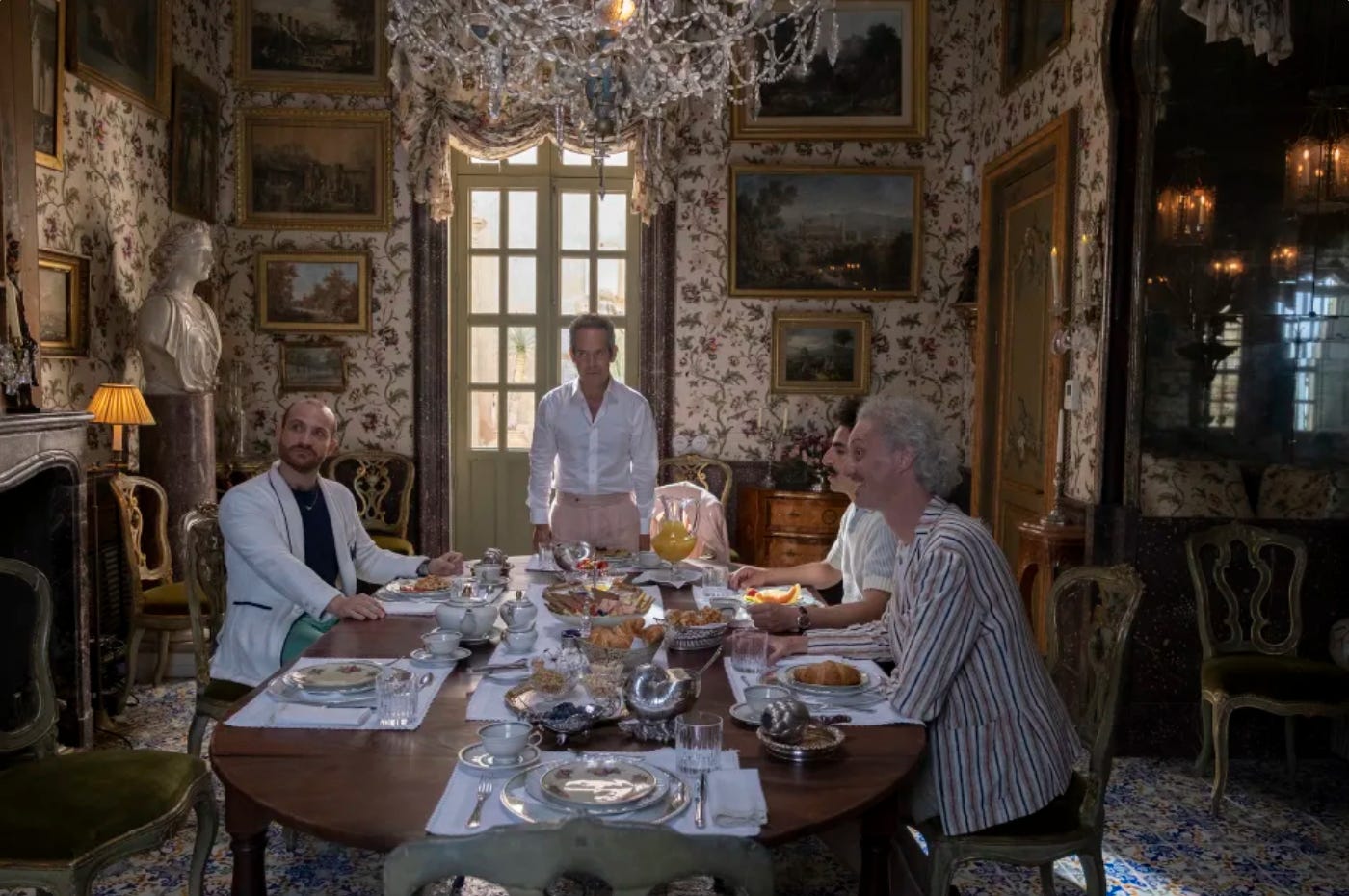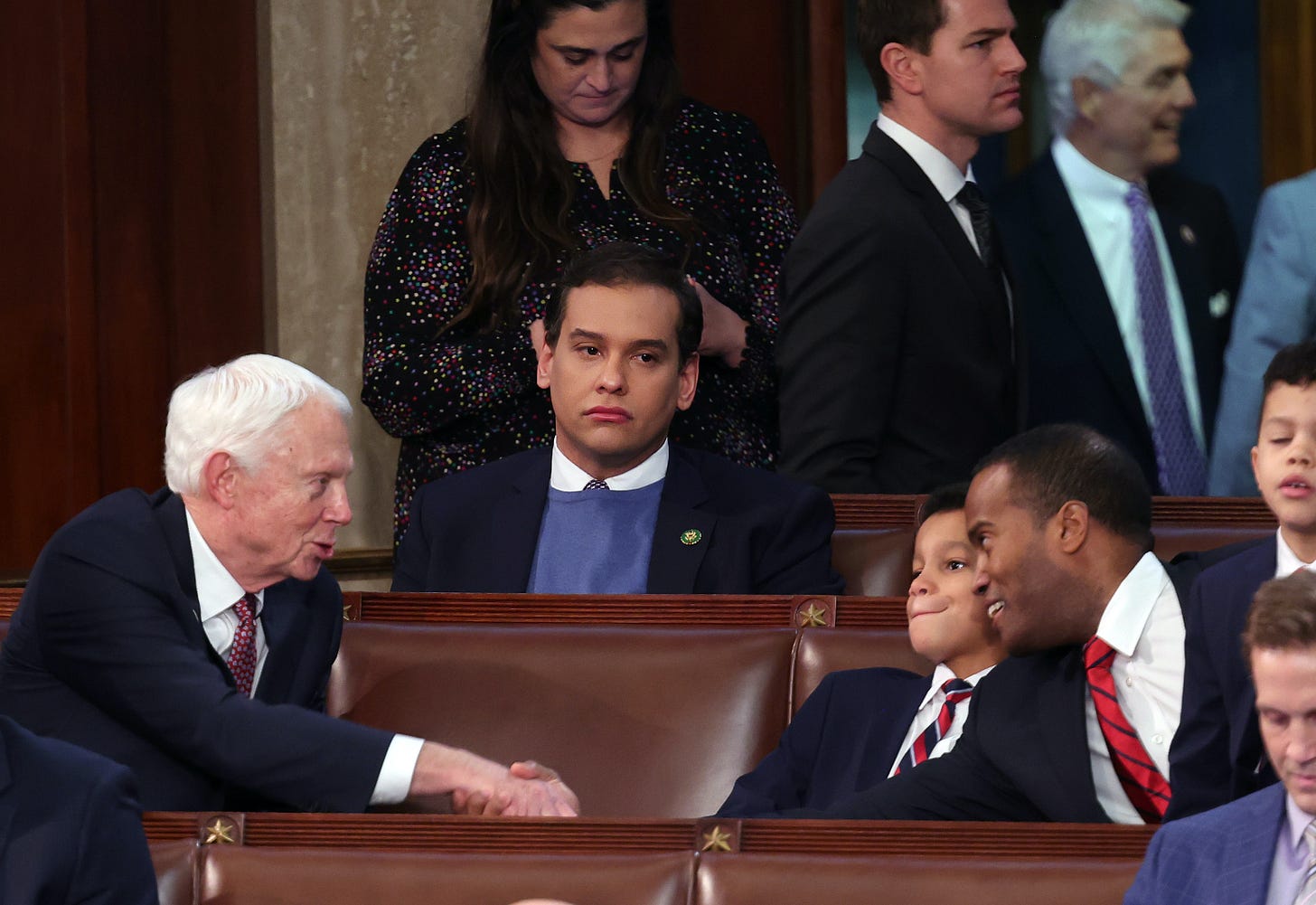The Return Of The Evil Gays
It's about time ...
“These gays — they’re trying to murder me!” - Tanya McQuoid.
The character played by Jennifer Coolidge was referring to a clique of overly-mannered, ethically dubious, prissy aesthetes in Mike White’s second season of The White Lotus. (The equally brilliant first season got some Dish love here.) The phrase is now beyond a meme. Meticulously manicured, deeply frivolous, and parasitic on the very wealthy (especially widowed heiresses they can fawn over and then dispossess), the gay trope was deeply, even shockingly, old-school for 2022.
I was in fact surprised and not a little relieved that Mike White wasn’t subject to some kind of cancellation threat for the portrayal. Chatting about the return of evil gays with my friend Jamie Kirchick (who’s writing a column on this as well), we noted that these characters would have been instantly recognized by audiences in much of the 20th Century as classic homosexuals — as surely as their actual sexual orientation would have never been explicitly mentioned in the movies and shows themselves. And they would have been thought of casually as evil. Like gayness itself.
Vito Russo’s brilliant documentary, The Celluloid Closet, ticked off every mini-trope of the evil gays of the 1940s and 1950s: gays as frivolous, fabulist, untrustworthy, sinister corrupters of youth. Their evil — like that of Jews in anti-Semitism — is defined by their secretiveness, their wicked intelligence, and their ability to hide in plain sight. They flout conventional values, worship the crafts of artifice and design, hone the arts of deception and deflection and share a kind of code that outsiders can never fully crack. In the 1950s — the darkest period for gay men in the last century — evil gays were also murderers, sexual abusers and pedophiles. So when Mike White included a scene where a beautiful young man is required to fuck an old queen in the bum in return for his safety and upkeep, it was hard not to flinch a little.
But not much. It’s fascinating what shifts in the political world can do to culture. The deep and pervasive cultural homophobia of much of the last century dissipated in the AIDS crisis, as gay men suddenly lost the aura of power and secrecy and were mercifully seen as powerless and exposed. The veiled ugliness morphed into a very unveiled banality, as we entered a sometimes worthy and sometimes cringe Will and Grace era, where gay men were masc and friendly, or camp and funny, and everyone liked us. (If you saw Jeffrey, my sympathies.)
Philadelphia was a turning point when Tom Hanks — Mr. America — was recruited to act as a leading gay man, dying of AIDS. Bruce Springsteen did the music. Queer Eye for the Straight Guy launched. Civil marriage and military service redefined the gay image as mainstream in many ways. Brokeback Mountain won big mainstream audiences. Ellen DeGeneres was everyone’s favorite lesbian comic — and Anderson Cooper (who came out on the Dish!) was everyone’s favorite anchor. Wholesome Christmas gay movies; earnest young, gay love affairs on TV; Windsor and Obergefell; gay marriage in the rural South — and increasingly across the planet. “Virtually Normal” hardly captures the scope of the shift.
There was always going to be a response to this mainstream cultural revolution. One response, of course, has been that the gay organizations, once dedicated to huge lifts like marriage equality, have little else to do but cater to the fringes who now run the show. “Queer theory” courses continue to turn out educated elites who think the whole point of being gay is “queerness” rather than just, well, you know, being attracted to the same sex. New alphabet letters and new genders are introduced with increasing rapidity. Gayness itself has become suspect — and “cis white gay men” regarded as irrelevant at best and downright oppressive at worst. In the context of White Lotus, for example:
Over on Twitter, “brown queer artist/activist” and filmmaker Leo Herrera invited his combined 35,000-plus followers to “talk about the use of gay tropes” on the series recently, getting not much traction. […] “I don’t want to be the ‘angry brown guy’ … but something we need to be aware of is that some of these gay white show-runners may believe we are past certain stereotypes or tropes — which brings up issues of race and privilege.”
Another response to gay equality has been the simultaneous stirring on the far right of the classic pedophile smear: that gays are “grooming” children in order to rape them, as in the ancient tradition of the Catholic Church. The “groomer” thing took off like a rocket — perhaps because it gave some an excuse to say out loud what they had repressed for so long: that gayness is just a pedophile perversion — and all gays are the same. It was stunning, in fact, how swiftly a legitimate critique of queer theory being taught in kindergarten became an old-fashioned “gays want to molest your kids” crusade, and how drag queens went from lovable clowns to “trans strippers” overnight. Beyond depressing.
But I think of the responses to gay integration from the two extremes as temporary reactionary backlash. For the right, we’ve seen a revival of the old-fashioned Christianist homophobia that many of us had hoped we’d left behind (but some had obviously been stewing in for a while). For the left, “trans” and “equity” are now the lodestars — with “gay” and “equality” long since left in the dust. In another unforeseen twist, trans ideology now actually reinforces rigid sex stereotypes, tells gender-nonconforming gay children they could be the opposite sex, and insists that homosexuality is a form of bigoted “genital preference,” rather than a normal variation in the human condition. Talk about reactionaryism.
Both reactionary moods are attempts to regain some equilibrium on either extreme after the triumph of the gay center in the first two decades of this century. I’m rattled by the capture of the gay rights movement by queer theory claptrap and by the homophobia that has always existed and that it has in part provoked. But I remain pretty secure that the center is going to hold — as the Respect for Marriage Act showed. Civil marriage rights, military service and open homosexuality in every field of life is here to stay. Most normies are fine with us. And we are with them.
And that’s the key context for the return of the trope of the evil gays — not as some terrible throwback, but as something we can now enjoy, laugh and talk about — and even celebrate — because we have effectively moved past the core political and legal struggle. Once you get past victimhood, you can have fun!
And some gays, like some straights, are evil! And they often do evil very, very well. Think of the great Disney villains that gays have long loved: The Lion King’s Scar, Prince John in Robin Hood, the dandy Captain Hook, Shere Khan in The Jungle Book, Jafar in Aladdin: all camp classics produced long before today’s banal and politicized “queering” agenda. Evil lesbians — aka single, powerful women — have also long been a Disney niche: from the original evil queen in Snow White to Cruella de Vil — the dog-killer based on Tallulah Bankhead — and Ursula the octopod is based on — yes! — Divine.
In the actual culture, we’re also returning to gay villainy. When Ellen went from being everyone’s favorite dyke to being some kind of monster toward her battered staffers, we got proof of principle. No, we can’t claim Harvey Weinstein, but we can Kevin Spacey. We’ve even got our own real life Mr. Ripley in Congressman George Santos. Ryan Murphy lugubriously disinterred gay psycho murderers, Andrew Cunanan and Jeffrey Dahmer, and got away with it. And a recent book by a couple of queer theorists, called Bad Gays, includes Roy Cohn, Ernst Röhm, Lawrence of Arabia and Hadrian! I was disappointed they only gave me a shoutout as a “professional Bad Gay,” for “When Plagues End.” In their earlier podcast, they placed me somewhere near Röhm in my fathomless gay evil. I’ve been demoted.
The left in particular loves outing right-wing gay villains — what else to make of Peter Thiel’s public image as a scary, behind-the-scenes super-rich gay? Or the intense loathing Pete Buttigieg summons up among self-described “queers”? Or the glee with which some gays delighted in the humiliation of Larry Craig? And think of the two gays singled out on left-Twitter as the personification of pure evil: Glenn Greenwald and Bari Weiss. Or the baldly homophobic mockery the media routinely doles out to Butters, aka Lindsey Graham. J Edgar Hoover could not have orchestrated a noisier attempt to destroy their reputations. But they’re still going strong! Gays do evil well. We even have some world class thugs: Ronnie Kray, Leopold and Loeb, Jeffrey Dahmer. And in the television world, no one will ever come close to Omar of The Wire. He remains for me the quintessence of gay villainy — in all its dark human complexity.
I once jokingly defined homophobia as being more irritated by gay men than is absolutely necessary — but my point is simply that treating gays as straights means to treat us as villains as well as heroes. The point of political equality is that it maximizes cultural freedom — to praise but also satirize, celebrate but also lament, laugh with but also sometimes laugh at. Gays do this to ourselves the whole time — as do so many other minority groups. And we can take it.
Even if Tanya ends up overboard.
(Note to readers: This is an excerpt of The Weekly Dish. If you’re already a subscriber, click here to read the full version. This week’s issue also includes: my take on the Speaker debacle; an illuminating talk with Nick Miroff on the border crisis and fentanyl emergency; a rich and amazing collection of reader stories on the end of life; more Ukraine dissents; eight notable quotes from the week in news; 14 links to Substack pieces we recommend; a Mental Health Break of nature’s beauty; a snowed-in view from Quebec and a sunny one from Vietnam; and, of course, the results of the View From Your Window contest — with a new challenge. Subscribe for the full Dish experience!)
From a fresh convert:
Well, darnit, I just can’t feel good anymore about not subscribing. I’ve resisted it for a while now, because even though I love most of your stuff, I disagree with a lot of it too, and wasn’t sure I wanted to subsidize promulgation of the parts I didn’t agree with. But of course it’s a little dumb to come listen to divergent opinions while refusing to help support the guy who arranged for me to hear the divergent opinions. More importantly, I’ve realized that it’s not just the opinions I come around for — it’s the environment that respectfully welcomes and explores opinions. Just having such an environment is worth a lot.
In that vein, I very much appreciated your willingness to sit down with Carl Trueman. For people like Carl and me, who believe that God’s commandments regarding morality are clear, lead to happiness, and ought to be obeyed, the modern world presents constant opportunities for consideration and growth. Your episode was part of that examination for me.
Boomers In The Twilight Zone: Your Dissents And Stories
After our recent column on Baby Boomers entering old age, an avalanche of readers sent their stories and reflections on the end of life. First, a dissent:
It is neither shocking nor disturbing that euthanasia represents three percent of Canadian deaths. Far more than three percent of Americans die slow or excruciating deaths. Why is it surprising that a significant fraction of such people chose euthanasia?
You linked to some disturbing anecdotes about Canadians being pressured to die. But reporting such stories without determining how common they are is not illuminating. Suppose two or three percent of Canadian euthanasia deaths are unseemly. There would be enough horror stories to make Canada look like a post-Christian charnel house, yet for every horror story, there would be 30 or more people who were able the end their lives painlessly and with some measure of control.
Canada’s system is not perfect and will have some growing pains, but is a vast improvement on our own.
Click here to read a rich and amazing collection of other dissents and many personal stories from readers on the agonizing choices they and their loved ones face in the twilight years of life. Your emails are the best of the Dish: raw, real, honest and fiercely intelligent. Don’t miss this discussion.
And, as always, keep the dissents coming: dish@andrewsullivan.com.
About The House
My take on the McCarthy mayhem is here, for paid subscribers.
New On The Dishcast: Nick Miroff
Back for a second pod appearance, Nick is the superb reporter at the Washington Post covering immigration and DHS, and before that he was a foreign correspondent based in Mexico City and Havana. This time we discuss not just the unending border crisis but also the fentanyl emergency — which Nick and his colleagues just covered in a must-read seven-part investigation. I know few people as honest and transparent as Nick on what’s actually happening at the border — and the profound dysfunction of our immigration system in a permanently deadlocked Congress.
Listen to the episode here. There you can find two clips of our convo — on how the Biden administration is erasing the meaning of asylum, and how fentanyl should be seen foremost as a poison. That link also takes you to listener feedback on our recent episode with Carl Trueman on the nature of homosexuality. (We also air several reader dissents over the grinding war in Ukraine.) Another brief note from a listener:
Thank you so much for featuring Carl Trueman and debating him respectfully. Featuring right-wing voices like his is what sets you apart. (And voices from the left, as well, of course.)
Another looks ahead:
I’ve really enjoyed the blog this year, and especially the podcasts. Yours is the only substack I pay for. Can’t wait to see what you tackle on 2023.
Next up is Glenn Loury, and also forthcoming: Rod Dreher, Matt Taibbi, and John Gray. Browse the entire Dishcast archive for an episode you might enjoy.
Face Of The Week
Mark Harris captions the above photo of evil gay George Santos with the following quote from Pet Shop Boys: “I never dreamt that I would get to be / The creature that I always meant to be / But I thought in spite of dreams / You’d be sitting somewhere here with me.”
In The ‘Stacks
This is a feature in the paid version of the Dish spotlighting more than a dozen of our favorite pieces from other Substackers every week. This week’s selection covers subjects such as the Speaker mess, the fertility collapse, and when sex tourists are women. Below is one example, followed by a brand new substack:
Incels who resent women so much that they become women themselves? Meet the transmaxxers.
Welcome at long last, Coleman Hughes!
You can also browse all the substacks we follow and read on a regular basis here — a combination of our favorite writers and new ones we’re checking out. It’s a blogroll of sorts. If you have any recommendations for “In the ‘Stacks,” especially ones from emerging writers, please let us know: dish@andrewsullivan.com.
The View From Your Window Contest
Where do you think it’s located? Email your guess to contest@andrewsullivan.com. Please put the location — city and/or state first, then country — in the subject line. Proximity counts if no one gets the exact spot. Bonus points for fun facts and stories. The winner gets the choice of a VFYW book or two annual Dish subscriptions. If you are not a subscriber, please indicate that status in your entry and we will give you a free month subscription if we select your entry for the contest results (example here if you’re new to the contest). Happy sleuthing!
The results for last week’s window are coming in a separate email to paid subscribers later today.
See you next Friday.






